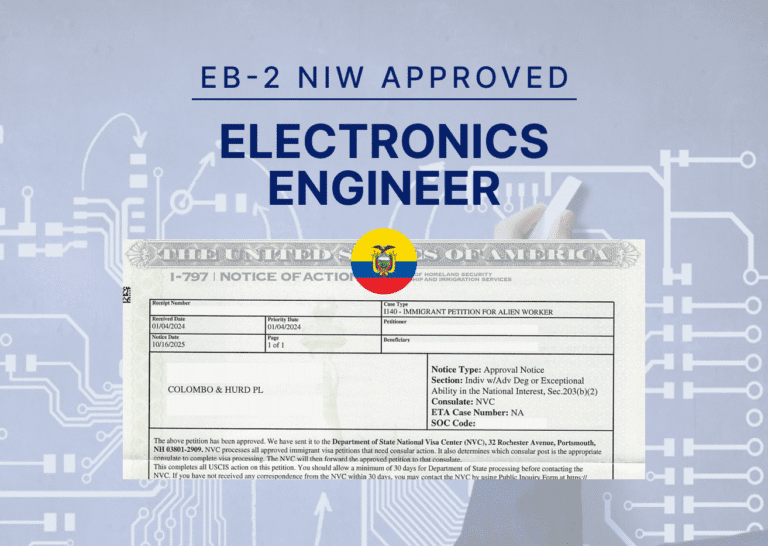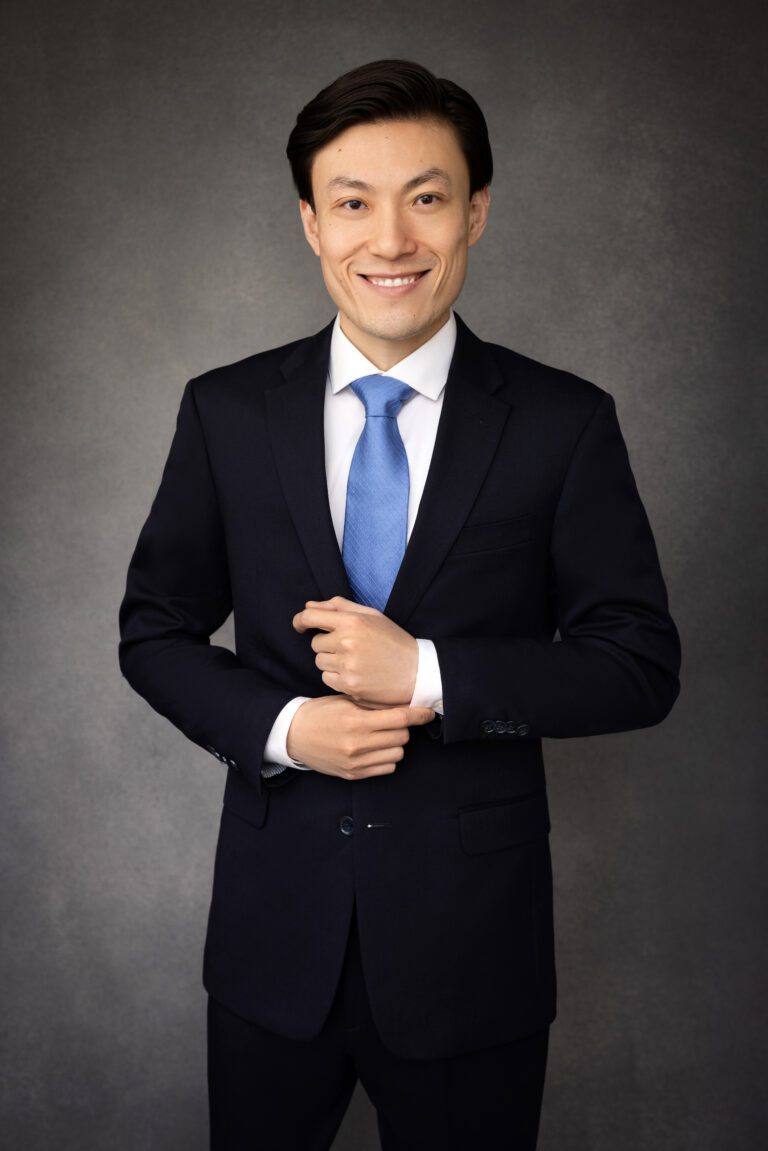Telecommunications Engineer
Our client, a telecommunications engineer from Ecuador, transformed her background in electronics and business management into a plan to strengthen broadband infrastructure across the United States. Her work focused on expanding high-speed connectivity through fiber and hybrid network systems that empower small and medium-sized companies (SMEs), especially those serving rural and underserved regions. With the guidance of Colombo & Hurd Immigration Attorney Jason Qiu, her EB-2 National Interest Waiver (NIW) petition was approved, recognizing the national importance of her efforts to close the country’s connectivity gaps.

An Engineer with a Mission to Connect Communities

Our client’s 13 years of experience in telecommunications combined technical precision with strategic vision. After earning her bachelor’s degree in electronics engineering and a master’s degree in business management, she began developing telecommunications projects designed to improve broadband access and reliability. Her approach was distinctive in that rather than focusing on large corporations, she concentrated on SMEs that often struggle to maintain cutting-edge telecommunications networks.
Her proposed endeavor centered on designing and implementing advanced telecommunications infrastructure strategies to optimize network interconnectivity, signal transmission, and service quality. She developed scalable, cost-effective methods to enhance broadband capacity nationwide and advance U.S. priorities for digital equity and economic development.
Mr. Qiu recalls that the client’s work stood out for its level of technical depth. While she wasn’t a researcher, she aimed to design specialized broadband network infrastructure and deploy advanced methodologies to optimize network monitoring. The challenge, he said, was to present that complex work “in a way that was approachable for the officer to clearly understand both its importance for the United States and the significance of the client’s past record of success in this highly technical field.”
Balancing Technical Detail with National Impact
During adjudication, United States Citizenship and Immigration Services (USCIS) issued a Request for Evidence (RFE) challenging whether the client’s endeavor carried national importance and whether she was well positioned to advance it. Mr. Qiu noted that the officer requested more information to discern the client’s record of success, particularly how her work was utilized by others in the field. Simultaneously, the officer appeared to impose heightened legal standards for approval that did not apply to this visa category. For example, the RFE conflated the requisite standard under Dhanasar with a showing of “original contributions of major significance,” which is language resembling EB-1A criteria, even though the petition was for an EB-2 NIW.
As Mr. Qiu explained, our team identified that the crux of successfully responding to the RFE was to present “a combination of methodical legal argumentation to help rectify the officer’s erroneous legal standards and careful presentation of the substantive evidence to frame the client’s work in terms of its overall significance.” We aimed to strike a balance between providing enough technical detail about her work while retaining focus on the bigger picture of how her work supports national initiatives to expand broadband access in the U.S.
Turning Complex Engineering into a Clear, National Story
The client’s endeavor, heavily based in broadband network design and implementation, required translating layers of engineering terminology into something meaningful and persuasive for a non-technical adjudicator.
To address these challenges, Mr. Qiu and our legal team presented the case in clear, accessible terms. Our team developed and refined the national importance statement to more clearly connect the client’s proposed endeavor to U.S. broadband priorities, including programs such as the Federal Communications Commission (FCC)’s Rural Digital Opportunity Fund and the United States Department of Agriculture (USDA)’s ReConnect Program.
Mr. Qiu shared that they aimed to be specific to her methodologies, not just talk about how broadband is generally important for the country. They focused on explaining how her optimized network architecture and monitoring systems could help small providers deliver better service.
The team also submitted an updated model or plan for future activities, refining the technical explanations by including a table comparing the client’s methodologies to existing frameworks in the U.S. market. This side-by-side comparison helped illustrate her unique contributions in a straightforward, visual way.
They also included an updated letter of recommendation highlighting the ways her work was already being implemented outside the U.S., as well as a service agreement with a potential U.S. customer, which demonstrated concrete demand for her expertise. These materials made it easy for the officer to understand the real-world value of her work without getting lost in technical complexity.
See if you qualify
Get your free EB-2 NIW visa profile evaluation today.
A Collaborative Effort that Earned Approval
The case was ultimately approved, affirming our client’s ability to make a meaningful contribution to U.S. telecommunications development. For Mr. Qiu, the approval was deeply satisfying after overcoming an RFE: “We knew the client had a long history of doing meaningful work in her field and that her proposed endeavor was nationally important, so it was rewarding to see the officer ultimately recognize these elements. We saw this approval as validation of our client’s hard work and future ambitions.”
He also noted that this successful result reinforced a broader message about the EB-2 NIW category: “It shows that EB-2 NIW is not limited to researchers. Applicants from a variety of fields can obtain approval if they can systematically show how their work aligns with national interests and clearly communicate the relevant strengths of their profile,” he explained.
This case became a success story because of how it connected innovation, entrepreneurship, and public benefit into one cohesive vision for the future of U.S. telecommunications.
“We knew the client had a long history of doing meaningful work in her field and that her proposed endeavor was nationally important, so it was rewarding to see the officer ultimately recognize these elements. We saw this approval as validation of our client’s hard work and future ambitions.”

